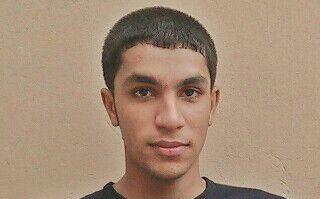Anwar Amer AlMohsen is a handball player, who played at the Al Ettifaq Club before his arrest at the age of 18. Since then, he has been subjected to torture to coerce confessions and convicted to life in prison in multiple unfair trials.
On 9 October 2013, officers from the Ministry of Interior, including riot police (likely the Special Security Force Command), as well as officers in plain clothing arrested Anwar from a religious institution in Duraz with three other individuals. No warrant was provided, but he had received seven summonses to appear at police stations before his arrest. Anwar claims that he was being targeted for participating in political protests and demonstrations, and that the charges against him were fabricated on political grounds.
The officers transferred Anwar to the Criminal Investigations Directorate (CID). That evening, officers took Anwar to his family home, where they locked all his family members in one room and conducted a search of the rest of the house, breaking doors and damaging the ceilings. The officers stated that they were searching for weapons, which they did not find.
The officers returned Anwar to the CID, where they subjected him to torture for two days to coerce a confession. Anwar reports that the officers interrogated him, beating him “severely,” subjected him to forced standing, insulted him, and harassed him, threatening him with further torture if he failed to confess.
As a result of the torture, Anwar signed confessions to the charges against him. After he signed this confession, he was taken to the Office of Public Prosecution (OPP), on the third day after his arrest. The prosecution informed him that if he did not sign and certify his confessions, he would be sent back to the CID for further interrogation and torture. He signed the confessions and was transferred to Dry Dock Detention Center pending his trials.
Throughout his pre-trial detention, Anwar was periodically transferred back to the CID for further interrogations and then to the OPP to sign confessions on new charges, and back to Dry Dock again.
Anwar was convicted on various charges in multiple trials, from 2014 to 2017. He was convicted on charges of attempted murder of security officers, possession of weapons, manufacture of weapons, and import of weapons; assaulting an officer and damaging a police vehicle; and establishing and joining a terrorist cell, possession of weapons, manufacturing of weapons and assault. He was sentenced to between five years in prison and a life sentence and striped of his Bahraini citizenship. His nationality was later reinstated by royal order on 20 April 2019. Sometime in 2016, he was transferred to Jau Prison after turning 21.
On 1 January 2017, a number of prisoners attempted to escape Jau Prison. Anwar was among the group, but was apprehended at the gate. Six months later he was transferred to what the prisoners refer to as the “isolation building,” where he remains. On 12 April 2018, Anwar was convicted of attempted prison break and sentenced to an additional 10 years in prison.
Throughout each of his trials, Anwar was appointed a lawyer by the court, but only saw his lawyer during sessions of the court. His confessions were also used in the trials against him.
On 15 August 2019, Anwar undertook a hunger strike with the other inmates in his building, protesting the prison’s “isolation” system and religious discrimination. The hunger strike ended after a few weeks, but the prisoners’ demands were not met, and conditions in the prison did not improve.
Bahrain’s actions against Anwar are in violation of Bahrain’s human rights obligations, including the Convention Against Torture and Other Cruel, Inhuman or Degrading Treatment or Punishment (CAT) and the International Covenant on Civil and Political Rights (ICCPR). The torture and ill treatment that officers subjected Anwar to are in violation of the prohibition on torture enshrined in the CAT, as well as Article 7 of the ICCPR. The use of his confessions obtained through torture to convict Anwar, combined with his lack of access to legal counsel, subjected him to an unfair trial, in violation of Article 14 of the ICCPR, and rendered his detention arbitrary, in violation of Article 9 of the ICCPR.
Americans for Democracy & Human Rights in Bahrain (ADHRB) calls on the government of Bahrain to annul Anwar’s conviction, in light of his unfair trials. If serious criminal charges can be maintained against him, we call for his re-trial to be held under international standards of fair trials, in line with Bahrain’s international obligations. We further call on the Bahraini authorities to investigate Anwar’s allegations of torture and ill treatment, with a view to holding the perpetrators accountable.





